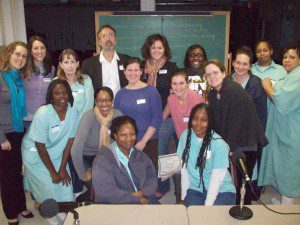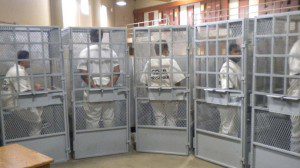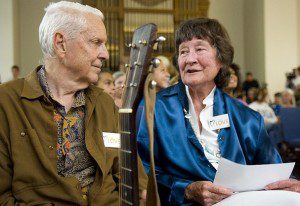
Project TURN is the prison-based education program that grew out of our realization here in Walltown that there are two kinds of people in America—those for whom prison is an unimaginable reality and those for whom it has always been part of their life. When we came here fresh from college with a lofty theological vision, most of us fell into the first category. We quickly learned that most of our neighbors live and move and have their being in the second.
Which is why, after several years of watching friends move in and out of the criminal justice system, we decided that School for Conversion needed to find a home in prison—a space where outsiders and inmates could sit together, learn from one another, and begin to cross this barrier that’s every bit as strong as the color line was a century ago.
Doing this sort of thing, you make friends. A few weeks ago, Project TURN’s director, Sarah Jobe, called me from the prison to say she needed help. Julie, a woman who’s been incarcerated for twenty years—a woman who has taken a number of our classes now—had just learned that she was being paroled. Today.
Of course, she knew that her release date was near. She had planned to start a re-entry program in three months. But the word she had just gotten on this particualr morning was that she had to leave today.
One of the many problems of our very broken system of mass incarceration is that it is not set up to care for people like Julie. Though nothing of this plan had been communicated to her, it was all within the law. No one had broken any rules. She was expected to get in a car, ride to the county of her infraction—a place she hasn’t visited in twenty years—and get out on the street corner. This, according to the system, is good news to Julie.
It was not. Her particular case was complicated by the fact that, due to the nature of the plea that she had agreed to sign when she was hauled into jail after reporting her husband for child abuse, Julie is registered as a “sex-offender.” This does not mean that she ever sexually abused a child. But it does mean that her name is on a list that makes everyone think she did. It also means she cannot live in a household with children or within 1000 feet of a school or daycare facility. That counts out all of our houses here in Walltown as well as most of the friends we know who are willing to welcome strangers into their homes.
This is the conundrum Sarah and I were discussing when, after a long pause, she said to me, “Well, call me if you think of anything. I’m going to call some other folks.” Her call to me having been perfectly useless, she started going down the list of other places that might help. For every answered phone, an apology. And a no.
Then, in a moment of desperation, Sarah picked up the list of women who’d come into the prison to study with Project TURN last semester. Graduate students, they’re mostly single. She decided to give them a try. Within an hour, two of them who are roommates called back to say, “Yes. Of course we’ll host Julie. Just tell us when she’ll be here.”
We’ve been at this peculiar form of education for going on five years now, and I can’t think of a better example of why it matters than this single story of welcome. Because Julie, if you know her, isn’t someone you want to see dumped out on a street corner. Because nothing overcomes the prison line in our society like a space where outsiders and incarcerated folks can meet on common ground.
At our School for Conversion board meeting a few weeks ago, Sarah shared with everyone that she is transitioning out of the Project TURN Director role. She’ll still be teaching at the prison where she’s been since the beginning. But the program that she launched so skillfully has grown beyond the time she has to manage it. I couldn’t be more grateful for the work she’s done.
But I was also delighted to be able to simultaneously introduce to our board Ian Strickland, who has already started as TURN’s incoming director. (He and Sarah will work together this summer to ease the transition.) Ian came on board at the beginning of June to assume oversight and management of TURN, as well as coordination of our Federal Prison site at Butner. Inspired by Sarah’s report on TURN’s recent growth and convicted that this is something more people need, the board committed to raise $10,000 this summer to expand Project TURN and bring Ian on for double the hours.
I’m delighted. But I also need your help. Could you make a one-time donation of $20 to help us make this happen? What’s more, could you help us spread the word about Project TURN and the good fruit that this program is beginning to bear?
Whether you’re the sort of person who could never imagine going to prison or the sort of person who’s always known you might, I hope you’ll join us. By creating spaces where it’s possible to imagine a better way, we sow the seeds of a better system here in the shell of the old.











